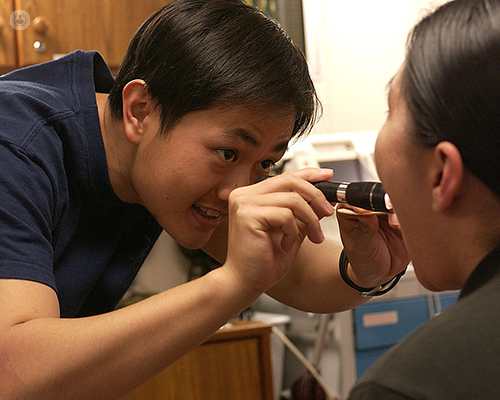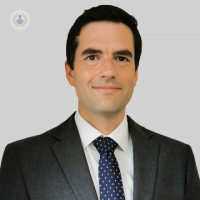When should the thyroid gland be removed?
Written by:When the thyroid gland secretion increases abnormally (hyperthyroidism), it can cause arterial hypertension, tachycardia, weight loss, diarrhoea, or nervousness. Sometimes, it may be necessary to have your thyroid gland removed. In this article below, highly regarded consultant ENT head and neck surgeon, Mr Andrew Moore, details how one's thyroid gland is removed.

How is the thyroid gland removed?
The removal of the thyroid gland is done by a horizontal incision of about 3cms in the front of the neck. The muscles that are in front of the thyroid (prethyroid muscles) are separated and the gland is totally or partially removed (a thyroid lobe), the latter being called a thyroid lobectomy.
Usually, one drainage channel is left, or two, depending on whether a thyroid lobectomy or total thyroidectomy is performed.
What are the main complications of thyroid gland removal?
There are three main complications of thyroid surgery:
- Bleeding can occur within the first eight hours postoperatively.
- Lesion of the laryngeal nerves, mainly the upper laryngeal nerve and recurrent nerve. These nerves are responsible for the movement of the vocal cords and runs between the trachea and the oesophagus, just below the thyroid gland, so dissection must be done very carefully.
- Effect on the parathyroid glands. These glands have nothing to do with the thyroid gland, because they are responsible for the metabolism of calcium, but when they are next to the thyroid, they are called parathyroids. There are four glands: one at each upper pole of the thyroid and another at each lower pole or lower side of the thyroid. Removal of the thyroid can temporarily injure them. The clinical manifestation of lesions on the parathyroids correspond to a decrease in calcium in the blood (hypocalcemia), which must be treated with calcium and even drugs that increase the absorption of calcium in the intestine. In these cases, the lesion lasts for a few weeks until the calcium levels normalise.
It is necessary to avoid exposure of the wound to the sun for six months so that the scar does not discolour.

What is recovery time like?
Thyroid surgery is a little painful, but the pain experienced will be tolerable. In the case of thyroid lobectomy (hemithyroidectomy), drainage is withdrawn within 24 hours and the patient is discharged.
In the case of total thyroidectomy, the length of stay may be 48 to 72 hours, since calcium controls must be performed on the blood. In the case of total thyroidectomy, the patient will have to take the thyroid hormone on a life-long basis, since the thyroid gland was removed and the body is no longer able to produce the hormone. The medication is usually in the form of one tablet a day, to be taken in the morning.
How long until the patient can return to life as normal?
The patient can eat from six to eight hours hours after thyroid surgery, is able to talk and resume normal activity in 24 hours, or in cases of total thyroidectomy, when the patient is discharged. It is advisable, however, that the patient takes a period of at least one week leave from work until the wound heals. Depending on the presence of other diseases that the patient has, their age, and the type of work they do, the downtime may be reduced or prolonged.
To book a consultation with Mr Andrew Moore, simply head on over and visit his Top Doctors profile today.


